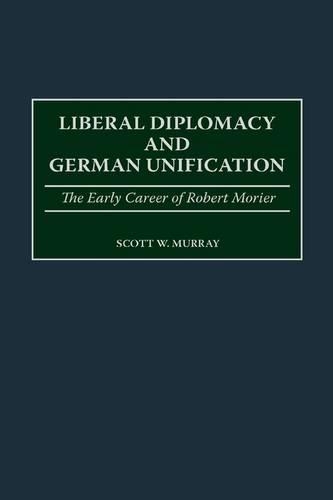
Liberal Diplomacy and German Unification: The Early Career of Robert Morier
(Hardback)
Publishing Details
Liberal Diplomacy and German Unification: The Early Career of Robert Morier
By (Author) Scott Murray
Bloomsbury Publishing PLC
Praeger Publishers Inc
30th June 2000
United States
Classifications
Tertiary Education
Non Fiction
Diplomacy
Biography: historical, political and military
Centrist democratic ideologies and movements
327.2092
Physical Properties
Hardback
304
Description
This work explores the early diplomatic career of Robert Morier, the British Foreign Office's foremost expert on German affairs in the period leading up to German unification in 1871. As the subject of an intellectual biography, Morier provides valuable insights into the effects of German events and ideas upon the changing character of mid-Victorian liberalism. Morier is an important figure in understanding the dynamics of Anglo-German relations during this period, not only because of his unrivalled knowledge of German affairs, but also because of his broad connections to prominent liberal politicians and intellectuals in both countries. Through Morier's career, Murray examines the general currents of political, economic, and cultural change. Murray addresses four main components of liberal thought under debate during the mid-Victorian period: constitutionalism and self-government; the problem of nationalism; free trade and commercial treaties; and church-state relations in the aftermath of the first Vatican Council. Robert Morier was forced to confront each of these themes as they found concrete expression in German events, engaging leading liberal intellectuals and politicians in discussions over the future of both Germany and Britain. Thus, Germany became an important source of debate among British liberals regarding several fundamental aspects of their ideology, the most prominent being the proper role of the state in a modern liberal society.
Reviews
[M]urray's book offers a persuasive refutation of the Sonderweg thesis....this superbly researched monograph makes a fine contribution to the study of nineteenth-century Anglo-German relations in general and the liberal mindset in particular.-German Studies Review
[M]urray's work is thoroughly researched, offers intriguing details, and provides an important dimension to understanding liberalism in nineteenth-century Britain and Germany.-Canadian Journal of History
This book give Morier the historical treatment he deserves....Murray has produced a seminal study of an important and illustrative figure of the Victorian era. His arguments are thoughtful and substantiated by convincing research.-Albion
This is a satisfying first book.-The International History Review
This is a satisfying first book.The International History Review
"Murray's book offers a persuasive refutation of the Sonderweg thesis....this superbly researched monograph makes a fine contribution to the study of nineteenth-century Anglo-German relations in general and the liberal mindset in particular."-German Studies Review
"Murray's work is thoroughly researched, offers intriguing details, and provides an important dimension to understanding liberalism in nineteenth-century Britain and Germany."-Canadian Journal of History
"[M]urray's work is thoroughly researched, offers intriguing details, and provides an important dimension to understanding liberalism in nineteenth-century Britain and Germany."-Canadian Journal of History
"This book give Morier the historical treatment he deserves....Murray has produced a seminal study of an important and illustrative figure of the Victorian era. His arguments are thoughtful and substantiated by convincing research."-Albion
"This is a satisfying first book."-The International History Review
"[M]urray's book offers a persuasive refutation of the Sonderweg thesis....this superbly researched monograph makes a fine contribution to the study of nineteenth-century Anglo-German relations in general and the liberal mindset in particular."-German Studies Review
Author Bio
SCOTT W. MURRAY teaches British History at Louisiana State University. He has published articles in The International History Review and The Canadian Review of Studies in Nationalism.
